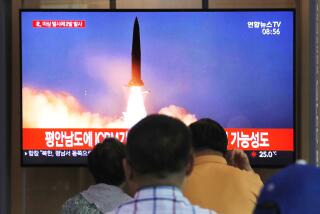Study Sees Devastation in Limited Nuclear Attack
- Share via
BOSTON — A limited nuclear attack on the United States, aimed only at refineries and oil ports, would cause mass starvation and devastate the economy, according to a study by the Massachusetts Institute of Technology.
“Studies have been done on the major uniform nuclear attacks of cities,” Kosta Tsipis, the study’s main author, said Sunday. “We all know what would probably happen. Many people would die, the economy would take a very deep dive, and after a great number of years, it might recover.”
But Tsipis studied what would occur if a nuclear attack using only 1% of the Soviet arsenal was aimed specifically at fuel supplies.
Loss of Transportation
The study, based on four years of computer simulation of nuclear attacks, found that such an assault would cause loss of transportation, energy production and major industries.
“There would be no more fuel for transportation, and if there’s no transportation, there would be no food in the cities,” Tsipis said. “Cities could neither receive (supplies) nor ship out.
“Industry can’t operate without transportation. People would go to the country for food, and industry would be left without labor. Within two years, you would have paralysis of the economy and mass starvation.”
According to the study, titled “Nuclear Crash,” survivors would face “near-medieval levels of existence” for decades.
Soviets More Vulnerable
The Soviet Union, if targeted with a similar attack, would be even more vulnerable than the United States because its industries are more concentrated and more often situated in urban areas, the study said.
Computer instructions used in the study were modifications of a computer program originally designed for the Federal Emergency Management Agency, which establishes relief measures in cases of war and disaster.
The agency scrapped the computer model in 1984 when federal agencies termed the model unrealistic.
Paul Krueger, FEMA’s assistant associate director for mobilization resources, could not be reached for comment on the study.
The New York Times reported Sunday that Krueger denied that he decided to abandon the model because government agencies believed its conclusions conflicted with government statistics on what would happen after a small-scale nuclear attack. The government statistics showed recovery would come much sooner.
More to Read
Sign up for Essential California
The most important California stories and recommendations in your inbox every morning.
You may occasionally receive promotional content from the Los Angeles Times.













